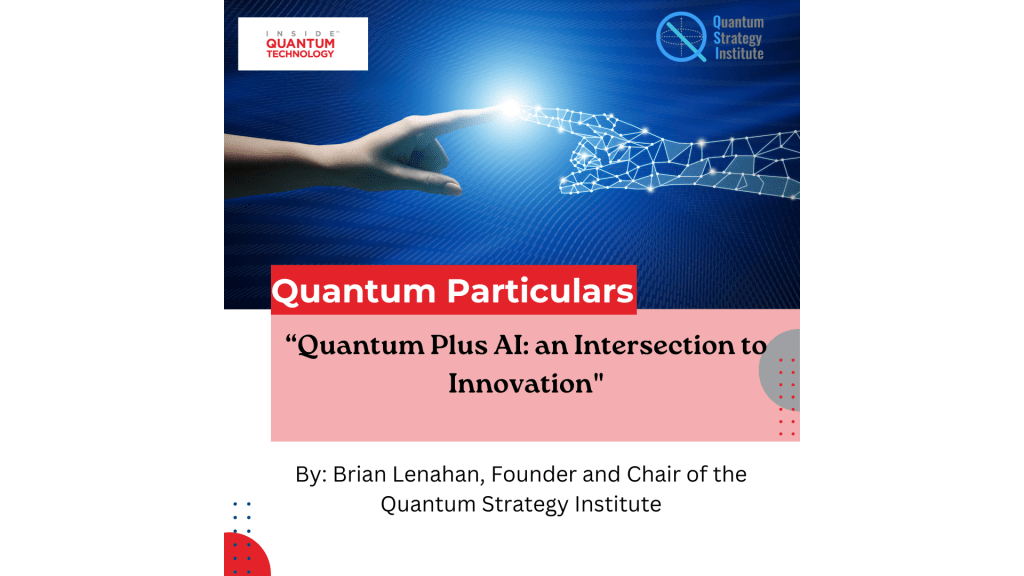“Quantum Particulars” is an editorial guest column featuring exclusive insights and interviews with quantum researchers, developers, and experts looking at key challenges and processes in this field. This article, focusing on the intersection between quantum technology and artificial intelligence (AI) was written by Brian Lenahan, Founder and Chair of the Quantum Strategy Institute.
Artificial intelligence (AI) and quantum technologies are two cutting-edge fields poised to dynamically alter every sector, and their intersection holds immense promise for the future of computing, optimization, and problem-solving. At the core of this intersection lies the potential to harness quantum computing power to enhance AI algorithms, and vice versa, with hybrid systems creating synergies that promise breakthroughs in areas such as machine learning, cryptography, and drug discovery. Yet the science is far from settled.
One significant area where AI and quantum technologies intersect is in quantum machine learning (QML). QML aims to utilize quantum computing’s unique properties, such as superposition and entanglement, to enhance machine learning algorithms. Quantum computers, some believe, are expected to efficiently process large amounts of data and perform complex calculations, enabling AI systems to analyze and learn from vast datasets more effectively.
Additionally, quantum computing is expected to accelerate AI training processes by exponentially speeding up computations. This speedup is particularly beneficial for training deep learning models, which typically require extensive computational resources and power consumption. By leveraging quantum algorithms, AI researchers can potentially train more complex models and achieve higher levels of accuracy in tasks such as image recognition, natural language processing, and autonomous driving.
Furthermore, quantum-enhanced algorithms have the potential to revolutionize optimization problems, which are pervasive in AI applications. Quantum annealing, for instance, offers a novel approach to solving optimization tasks by leveraging quantum principles to explore vast solution spaces more efficiently. This capability could significantly improve AI systems’ ability to find optimal solutions in complex scenarios, such as supply chain management, financial portfolio optimization, and resource allocation.
Opposing Views
Some stakeholders propose that a pivotal convergence between artificial intelligence (AI) and quantum computing lies in the potential of the latter to enhance Large Language Models (LLMs), thus contributing to the advancement of Artificial General Intelligence (AGI). Multiverse Computing, for example, intends to reduce the cost of LLM training through quantum-inspired software.
Olivier Ezratty, well-known industry observer recently penned a paper titled “How AI, LLMs and quantum science can empower each other?” His conclusion? “The landscape studied in this paper shows an unbalanced situation where machine learning is currently helping quantum technologies more than the other way around. As a result, “ask not what quantum computing can do for AI, ask what AI can do for quantum science”?
So, it has been suggested by Ezratty and others that the discussion concerning the fusion of AI and quantum computing might be more accurately framed within the context of machine learning (ML) and quantum computing. This reorientation is particularly relevant when considering the efficiency gains in processing smaller datasets—an area where quantum simulators currently exhibit promise, with the potential for quantum computers (QCs) to further extend these capabilities in the foreseeable future. Such an approach not only offers immediate utility but also hints at a scalable pathway for future advancements.
Momentum With AI
It’s conceivable that QC could chart a trajectory akin to Field-Programmable Gate Arrays (FPGA). General libraries may not materialize due to the intricate process of aligning specific use cases with algorithms, compounded by the challenge of delivering tangible value since classical computing remains the baseline. Deriving value from these algorithms will necessitate internal champions within various industries who possess both quantum expertise and deep knowledge of their respective fields. While vendors and academics may contribute additional tools, the onus of commercial implementation will largely fall on these experts. Once a use case within a specific industry demonstrates significant impact, momentum within that entire sector will likely surge.
However, this momentum will only materialize if application layers are established, where quantum computing seamlessly integrates into existing applications and workflows without the end user needing to grasp the intricacies of qubits. Eventually, the technology should evolve to a point where the end user doesn’t even need to be aware of the underlying quantum mechanics.
Learn more about the intersection of Quantum and Artificial Intelligence at Inside Quantum Technology New York in October 2024.
Brian Lenahan, Founder and Chair of the Quantum Strategy Institute, is a seven-time published author on topics related to artificial intelligence and quantum technologies and a three-time LinkedIn Quantum Top Voice. He consults with corporate and SME organizations, primarily developing technology roadmaps. Brian writes extensively about these two subjects on LinkedIn and in his substack “Quantum’s Business.”
